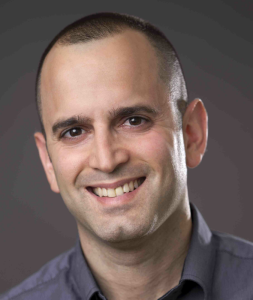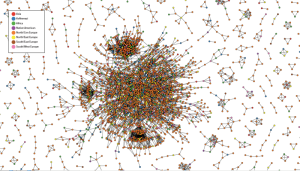Are you related to your spouse? Your best friend? Your neighbor? The answer may be more surprising than you think. The scientists behind the website DNA.LAND hope to do more than just map a family tree of the world, but that’s a start.

The SXSW Interactive panel “DNA.Land: Mapping the World’s Family Tree,” features the website’s co-creator, Yaniv Erlich. Erlich is a core member of the New York Genome Center and a professor at Columbia University. The other speaker of the panel will be author and journalist AJ Jacobs, who has done research regarding his own family tree, in an attempt, as Erlich says, to see how he is related to every person possible.
“There are many people that are interested in genealogy, just in where they came from and their genetic information,” says Erlich. “So what I’m going to look at what happens when you take one story, like the AJ Jacobs story, and replicate it, or multiply it, by 8 billion times.”
Jacobs’ personal story is only the beginning of what Erlich says will be discussed in the panel.
While the study looks at how closely people are related to one another (Erlich says many spouses have found they are cousins), the bigger picture deals with what can be found with trends in the human genome.
One of the trend they can track is human migration, he says. Past the obvious migration from Europe to the Americas, Erlich says they can look at small-scale migration. What directions do humans travel? North and south? East and west? They are also able to track genetic mutations this way.
“Each one of us, when we are born, we have about 100 mutations that don’t exist in our current genome. Most of them are benign. Most (do not cause) significant health issues,” he said.
But finding a specific gene that causes a genetic disease is key to a cure. The hard part is finding the gene that causes a problem mutation.
“Once you have a gene, you can screen future babies…you can give (information) to the parents about their future reproduction,” Erlich said. “And you can start to get the biology. If you have a gene you can see the biology, and this is the key. It’s a key to treatment.”
Erlich says he and his team have helped several families who come to them looking to cure a genetic disorder.
“They want to know what’s wrong with their kids and we had to find the mutation in the genome. Now the genome is a huge place,” he said. “To know the genome of the mutation, of a baby like that, I need to look at the genome of the baby and be able to look at all the changes that are benign. What is the cause of the change?”
The way to do this is to look at a large number of healthy individuals and look at the changes in their genomes.
“Every time I see a change in their genome, I can say, ‘This is not what the baby suffers from.’ Because if this was the case, these healthy individuals would not have the same gene,” he said.
At DNA.LAND, users can upload a profile of their genome, which they can receive through sites like Ancestry.com and others. They are then able to find more information, not just through their genealogy site of choice, but through the combined information of multiple sites, processed and stored with the help of Geni.com.

“(Before, users could) only search relatives inside their silo of their database,” Erlich said. “If I can get people from different companies, I can start to stick person one from company A and match it to theoretical company B. So I can find new relatives for these people.”
Matching users to more relatives is an incentive that Erlich says makes the site fun for users, and provides them more with a sense of satisfaction of contributing to a scientific cause.
The site exceeded Erlich’s expectations in the first day alone, where the site received 2,000 genomes in the first day. Several months later, they have over 14,000 genomes.
Erlich says he hopes attendees will leave the panel with an understanding of several things.
“First that their individual story can really contribute to science. The second thing I want them to think about is that we’re all related. If you think about how we’re all related, think about all the wars that are going on. Isn’t it such a shame? We’re all family,” he says. “The third thing is about genetic disorders and the notion that it takes a village? It takes a village to raise a kid? It takes a country. It takes the world. To be able to assist kids with genetic disorders.”
When and Where:
Friday, March 11
3:30 p.m. – 4:30 p.m.
Westin Austin Downtown – Paramount 2-3/ 301 E 5th St.
Find out more: DNA.Land: Mapping the World’s Family Tree
